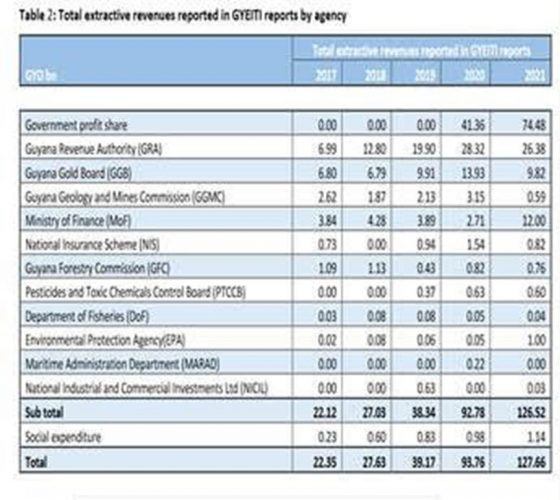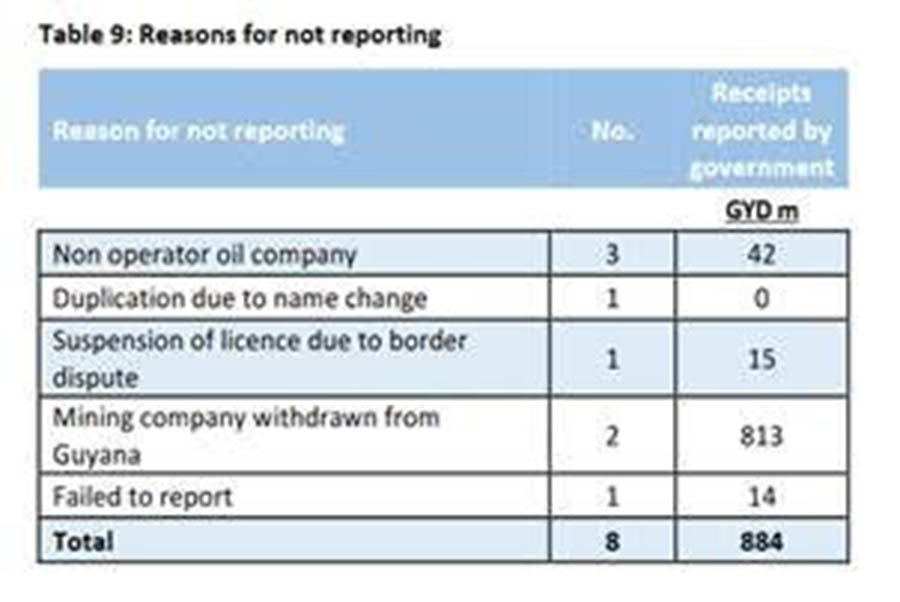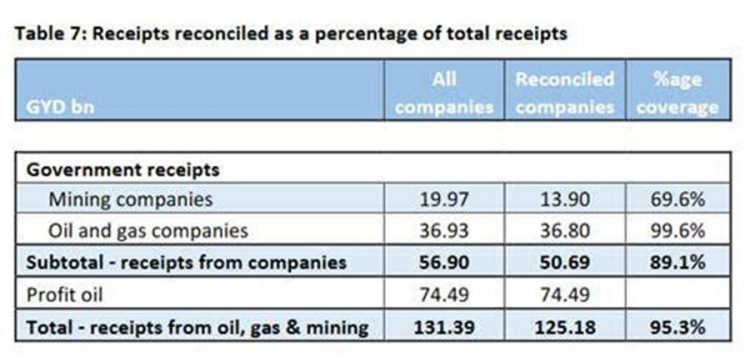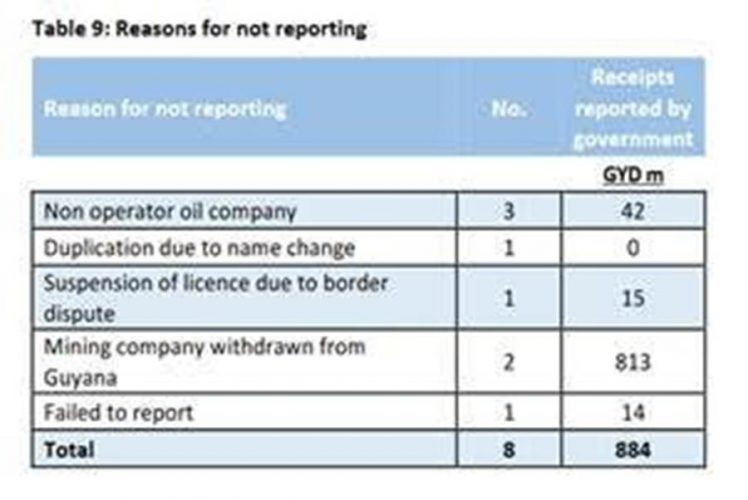The 2021 earnings from the oil, gas, and mining sectors which were subject to reconciliation between the government and respective entities in these sectors represented 89.1% of the total incomes reported by stakeholders, the Guyana Extractive Industries and Transparency Initiative (GYEITI) disclosed in its 2021 report.
The body which seeks to promote revenue transparency in the extractive sector in resource-rich countries, in its 2021 report published on December 29, 2023, said that reconciliation of 99.6% coverage was achieved in the oil and gas sector.
A lower coverage of (69.6%) was achieved in the mining sector and the scope to improve coverage of this sector in future reports is an area which the Multi-stakeholder Steering Group (MSG) could consider, EITI recommended.
Government earnings from forestry and fisheries were declared by the government agencies, but the MSG decided not to collect data from companies for reconciliation, the report informed.
For the oil & gas and mining sectors, a comparison of the total receipts reported by the government with the value of government receipts after reconciliation which were reported by companies selected for inclusion in the reconciliation is shown below in Table 7. The income received by the government from the sale of profit oil is shown separately, so that the proportion of receipts from companies may be seen.
Notably, with the inclusion of profit oil, 95.3% of government revenue in 2021 from the extractive sector was reconciled.
Guyana recorded a 36% increase in revenues generated from the extractive sector in 2021, the report which was approved by the MSG noted.
The 238-page document noted an increase in extractive revenues from $93.78 billion in 2020 to $127.66 billion in 2021, representing a net increase of 36%. For 2021, oil and gas recorded $112.43 billion, representing 88% of revenues from the extractive sector.
Meanwhile, the revenue recorded from the mining sector accounted for 11% of the earnings, a total of $13.9 billion. Additionally, the forestry sector accounted for 1% of the extractive revenues earned by Guyana, at a total of $1.18 billion. The fisheries sector contributed less than 1% of the extractive earnings, raking in only some$150 million in 2021.
Data on employment, including gender distribution, and production, was also collected from the reported entities regarding the revenues for the year 2021.
However, of the 21 entities reported, 4 non-operators in the oil & gas sector reported no employment data, while the remaining 17 had a total of 2,709 direct and contracted employees in the extractive sectors.

A total of 1,665 persons were directly employed while 1,044 were contracted, according to GYEITI. The stakeholder steering group selected 17 companies from the oil & gas sector for inclusion in the EITI reconciliation, together with companies holding large-scale mining licences (5) and all gold dealers (7); a total of 25 companies and 4 unincorporated entities.
One State Owned Enterprise (SOE) with interests in mining companies was also selected.
The MSG decided that companies and individuals holding small and medium-scale licences would not be included on a disaggregated basis irrespective of the amount of their payments individually to the government.
The steering group recommended that it would be better for the earnings by the government from these licence holders to be reported in aggregate with other non-participating entities.
One state-owned enterprise, National Industrial and Commercial Investments Limited (NICIL) had shown interests in two companies in the mining sector.
NICIL returned templates signed by senior management, and an independent assurance report was provided by the Auditor General.
But GYEITI in its report said that the state-owned entity has not produced audited accounts since 2013.
Private entities
According to EITI, 21 of the 25 private companies and 4 unincorporated entities were included in the reconciliation report. However, 4 entities were exempted but their submissions were signed by the senior management and 2021 audited accounts were provided by 12 companies.
Eight companies did not report with various reasons for non-reporting as shown in Table 9.
Three companies wrote to explain that as non-operators, payments were made on their behalf. These are: Hess Exploration Guyana Limited, TOQAP Guyana B.V, and Total E&P Guyana B.V.
One company changed its name and was already included in the selection under the new name – Ratio Energy Limited. The licence of one company has been suspended due to the border dispute with Venezuela – Anadarko Guyana Company.
Two companies terminated their operations in Guyana after 2021 and did not participate in the GYEITI 2021 reconciliation: Troy Resources Guyana Inc, and Bauxite Co of Guyana Inc.
One company failed to provide any information or a tax disclosure waiver – Adolphus Mining Inc.
The government agencies are required by law to produce annual audited financial statements. Of the major revenue collecting agencies, Guyana Revenue Authority (GRA) (revenue only) has been audited for 2021 and 2022, as part of the audit of the National Accounts, and the accounts for both years have been laid in Parliament.
The financial statements from the Guyana Gold Board (GGB) have been audited for 2021 and 2022. The last audited financial statements for The Guyana Geology and Mines Commission were for the period 2012.
GYEITI is a part of the global initiative, the Extractive Industries Transparency Initiative (EITI). EITI seeks to promote revenue transparency in the extractive sector in resource-rich countries. It strives to ensure transparency over payments made to and revenues received by the Government from companies in the extractive sectors. Guyana joined the EITI in 2017 and has published five EITI reports.
GYEITI is governed by a broad coalition of government, civil society, and the private sector.








